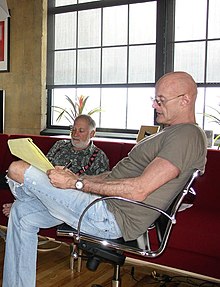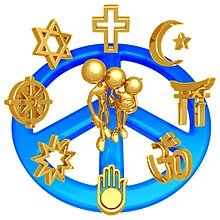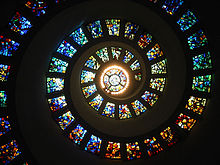Ken Wilber

Kenneth Earl Wilber Jr. (born 31 January 1949) is an American author who writes on psychology, philosophy, mysticism, ecology, and spiritual evolution. His work formulates what he calls an "integral theory of consciousness". He is a leading proponent of the integral movement and founded the Integral Institute in 1998.
Quotes
[edit]


- In fact, at this point in history, the most radical, pervasive, and earth-shaking transformation would occur simply if everybody truly evolved to a mature, rational, and responsible ego, capable of freely participating in the open exchange of mutual self-esteem. There is the "edge of history". There would be a real New Age.
- Up From Eden (1981), p. 328
- Modern science is no longer denying spirit. And that, that is epochal. As Hans Küng remarked, the standard answer to "Do you believe in Spirit?" used to be, "Of course not, I'm a scientist", but it might very soon become, "Of course I believe in Spirit. I'm a scientist."
- The Holographic Paradigm and Other Paradoxes: Exploring the Leading Edge of Science (1982), Introduction
- Prana is implicate to matter but explicate to mind; mind is implicate to prana but explicate to soul; soul is implicate to mind but explicate to spirit; and the spirit is the source and suchness of the entire sequence.
- Eye to Eye: The Quest for the New Paradigm (1984), pp. 197-198
- An argument can be legitimately sustained only if the participants are speaking about the same level. Argumentation would—for the most part—be replaced with something akin to Niels Bohr's principle of complementarity. Information from and about the different vibratory levels of bands of consciousness—although superficially as different as X-Rays and radio waves—would be integrated and synthesized into one spectrum, one rainbow. … Each band or level, being a particular manifestation of the spectrum, is what it is only by virtue of the other bands. The color blue is no less beautiful because it exists along side the other colors of a rainbow, and "blueness" itself depends upon the existence of the other colors, for if there were no color but blue, we would never be able to see it. In this type of synthesis, no approach, be it Eastern or Western, has anything to lose—rather, they all gain a universal context.
- The Spectrum of Consciousness (1993), Prologue, p. 6
- The real intent of my writing is not to say, you must think in this way. The real intent is: here are some of the many important facets of this extraordinary Kosmos; have you thought about including them in your own worldview? My work is an attempt to make room in the Kosmos for all of the dimensions, levels, domains, waves, memes, modes, individuals, cultures, and so on ad infinitum. I have one major rule: Everybody is right. More specifically, everybody—including me—has some important pieces of truth, and all of those pieces need to be honored, cherished, and included in a more gracious, spacious, and compassionate embrace. To Freudians I say, Have you looked at Buddhism? To Buddhists I say, Have you studied Freud? To liberals I say, Have you thought about how important some conservative ideas are? To conservatives I say, Can you perhaps include a more liberal perspective? And so on, and so on, and so on… At no point I have ever said: Freud is wrong, Buddha is wrong, liberals are wrong, conservatives are wrong. I have only suggested that they are true but partial. My critical writings have never attacked the central beliefs of any discipline, only the claims that the particular discipline has the only truth—and on those grounds I have often been harsh. But every approach, I honestly believe, is essentially true but partial, true but partial, true but partial.
And on my own tombstone, I dearly hope that someday they will write: He was true but partial…
- My ankle hurts from dancing last night, so there is pain, but the pain doesn't hurt me, for there is no me.
- One Taste (2000), p. 59
- In other words, all of my books are lies. They are simply maps of a territory, shadows of a reality, gray symbols dragging their bellies across the dead page, suffocated signs full of muffled sound and faded glory, signifying absolutely nothing. And it is the nothing, the Mystery, the Emptiness alone that needs to be realized: not known but felt, not thought but breathed, not an object but an atmosphere, not a lesson but a life.
- "Foreword" to Ken Wilber: Thought as Passion (2000) by Frank Visser, p. xv
- An integral approach is based on one basic idea: no human mind can be 100% wrong. Or, we might say, nobody is smart enough to be wrong all the time. And that means, when it comes to deciding which approaches, methodologies, epistemologies, or ways or knowing are "correct", the answer can only be, "All of them." That is, all of the numerous practices or paradigms of human inquiry—including physics, chemistry, hermeneutics, collaborative inquiry, meditation, neuroscience, vision quest, phenomenology, structuralism, subtle energy research, systems theory, shamanic voyaging, chaos theory, developmental psychology—all of those modes of inquiry have an important piece of the overall puzzle of a total existence that includes, among other many things, health and illness, doctors and patients, sickness and healing.
- Forward to Integral Medicine: A Noetic Reader (2003) edited by Marilyn Schlitz & Tina Hyman
- Unsourced variant: I don't believe that any human mind is capable of 100 percent error… Nobody is smart enough to be wrong all the time.
Sex, Ecology, Spirituality (1995, 2000)
[edit]

- It is the integrative power of vision-logic, I believe, and not the indissociation of tribal magic or the imperialism of mythic involvement that is desperately needed on a global scale. For it is vision-logic with its centauric/planetary worldview that, in my opinion, holds the only hope for the integration of the biosphere and the noosphere, the supranational organization of planetary consciousness, the genuine recognition of ecological balance, the unrestrained and unforced forms of global discourse, the nondominating and noncoercive forms of federated states, the unrestrained flow of worldwide communicative exchange, the production of genuine world citizens, and the enculturation of female agency (i.e., the integration of male and female, in both the noosphere and the biosphere)—all of which, in my opinion, is nevertheless simply the platform for the truly interesting forms of higher and transpersonal states of consciousness lying in our collective future—if there is one.
- The single greatest world transformation would simply be the embrace of global reasonableness and pluralistic tolerance—the global embrace of egoic-rationality (on the way to centauric vision-logic).
- In other words, the real problem is not exterior. The real problem is interior. The real problem is how to get people to internally transform, from egocentric to sociocentric to worldcentric consciousness, which is the only stance that can grasp the global dimensions of the problem in the first place, and thus the only stance that can freely, even eagerly, embrace global solutions.
- Global consciousness is not an objective belief that can be taught to anybody and everybody, but a subjective transformation in the interior structures that can hold belief in the first place, which itself is the product of a long line of inner consciousness development.
- The more we emphasize teaching a merely Right-Hand map of systems theory or a Gaia Web of Life, instead of equally emphasizing the importance of interior development from egocentric to sociocentric to worldcentric, then the more we are contributing to Gaia's demise.
- "Saving the biosphere" depends first and foremost on human beings reaching mutual understanding and unforced agreement as to common ends. And that intersubjective accord occurs only in the noosphere. Anything short of that noospheric accord will continue to destroy the biosphere.
A Brief History of Everything (1996)
[edit]
Studies on testosterone … all point to a simple conclusion. I don't mean to be crude, but it appears that testosterone basically has two, and only two, major drives: fuck it or kill it.
And males are saddled with this biological nightmare almost from day one, a nightmare women can barely imagine (except when they are given testosterone injections for medical purposes, which drives them nuts. As one woman put it, "I can't stop thinking about sex. Please, can't you make this stop?").
- Introduction
- Are the mystics and sages insane? Because they all tell variations on the same story, don't they? The story of awakening one morning and discovering you are one with the All, in a timeless and eternal and infinite fashion. Yes, maybe they are crazy, these divine fools. Maybe they are mumbling idiots in the face of the Abyss. Maybe they need a nice, understanding therapist. Yes, I'm sure that would help. But then, I wonder. Maybe the evolutionary sequence really is from matter to body to mind to soul to spirit, each transcending and including, each with a greater depth and greater consciousness and wider embrace. And in the highest reaches of evolution, maybe, just maybe, an individual's consciousness does indeed touch infinity—a total embrace of the entire Kosmos—a Kosmic consciousness that is Spirit awakened to its own true nature. It's at least plausible. And tell me: is that story, sung by mystics and sages the world over, any crazier than the scientific materialism story, which is that the entire sequence is a tale told by an idiot, full of sound and fury, signifying absolutely nothing? Listen very carefully: just which of those two stories actually sounds totally insane?
- p. 42
- Gaia's main problems are not industrialization, ozone depletion, overpopulation, or resource depletion. Gaia's main problem is the lack of mutual understanding and mutual agreement in the noosphere about how to proceed with those problems. We cannot rein in industry if we cannot reach mutual understanding and mutual agreement based on a worldcentric moral perspective concerning the global commons. And we reach the worldcentric moral perspective through a difficult and laborious process of interior growth and transcendence.
- Spirit slumbers in nature, awakens in mind, and finally recognizes itself as Spirit in the transpersonal domains.
- There is intersubjectivity woven into the very fabric of the Kosmos at all levels.
The Eye of Spirit: An Integral Vision for a World Gone Slightly Mad (1997)
[edit]


- We move from part to whole and back again, and in that dance of comprehension, in that amazing circle of understanding, we come alive to meaning, to value, and to vision: the very circle of understanding guides our way, weaving together the pieces, healing the fractures, mending the torn and tortured fragments, lighting the way ahead—this extraordinary movement from part to whole and back again, with healing the hallmark of each and every step, and grace the tender reward.
- The integral approach is committed to the full spectrum of consciousness as it manifests in all its extraordinary diversity. This allows the integral approach to recognize and honor the Great Holarchy of Being first elucidated by the perennial philosophy and the great wisdom traditions in general. … The integral vision embodies an attempt to take the best of both worlds, ancient and modern. But that demands a critical stance willing to reject unflinchingly the worst of both as well.
- An acknowledgment of the full spectrum of consciousness would profoundly alter the course of every one of the modern disciplines it touches—and that, of course, is an essential aspect of integral studies… A full-spectrum approach to human consciousness and behavior means that men and women have available to them a spectrum of knowing—a spectrum that includes, at the very least, the eye of flesh, the eye of mind, and the eye of spirit.
- The integral vision, I believe, is more than happy to welcome empirical science as a part—a very important part—of the endeavor to befriend the Kosmos, to be attuned to its many moods and flavors and facets and forms. But a more integral psychology goes beyond that … With science we touch the True, the "It" of Spirit. With morals we touch the Good, the "We" of Spirit. What, then, would an integral approach have to say about the Beautiful, the "I" of Spirit itself? What is the Beauty that is in the eye of the Beholder? When we are in the eye of Spirit, the I of Spirit, what do we finally see?
- Anybody can they say they are being "spiritual"—and they are, because everybody has some type and level of concern. Let us therefore see their actual conception, in thought and action, and see how many perspectives it is in fact concerned with, and how many perspectives it actually takes into account, and how many perspectives it attempts to integrate, and thus let us see how deep and how wide runs that bodhisattva vow to refuse rest until all perspectives whatsoever are liberated into their own primordial nature.
- The Realization of the Nondual traditions is uncompromising: There is only Spirit, there is only God, there is only Emptiness in all its radiant wonder. All the good and all the evil, the very best and the very worst, the upright and the degenerate—each and all are radically perfect manifestations of Spirit precisely as they are. There is nothing but God, nothing but the Goddess, nothing but Spirit in all directions, and not a grain of sand, not a speck of dust, is more or less Spirit than any other.
The Marriage of Sense and Soul (1998)
[edit]
- There is arguably no more important and pressing topic than the relation of science and religion in the modern world. Science is clearly one of the most profound methods that humans have yet devised for discovering truth, while religion remains the single greatest force for generating meaning. Truth and meaning, science and religion; but we still cannot figure out how to get the two of them together in a fashion that both find acceptable.
- These two enormous forces—truth and meaning—are at war in today's world. … And something sooner or later has to give.
- Within the scientific skeleton of truth, religious meaning attempts to flourish, often by denying the scientific framework itself—rather like sawing off the branch where you cheerily perch. The disgust is mutual because modern science gleefully denies virtually all the basic tenets of religion in general. According to the typical view of modern science, religion is not much more than a holdover from the childhood of humanity, with about as much reality as, say, Santa Claus. Whether the religious claims are more literal (Moses parting the Red Sea) or more mystical (religion involves direct spiritual experience), modern science denies them all, simply because there is no credible empirical evidence for any of them.
- This is a massive and violent schism and rupture in the internal organs of today's global culture and this is exactly why many social analysts believe that if some sort of reconciliation between science and religion is not forthcoming, the future of humanity is, at best, precarious.
An Integral Spirituality
[edit]


- What's my philosophy? In a word, integral. And what on earth—or in heaven—do I mean by "integral"? The dictionary meaning is fairly simple: "comprehensive, balanced, inclusive, essential for completeness." Short definition, tall order.
- We have, for the first time in history, easy access to all of the world's great religions. Examine the many great traditions—from Christianity to Buddhism, Islam to Taoism, Paganism to Neoplatonism—and you are struck by two items: there are an enormous number of differences between them, and a handful of striking similarities.
When you find a few essential items that all, or virtually all, of the world's great religions agree on, you have probably found something incredibly important about the human condition, at least as important as, say, a few things that physicists can manage to agree on (which nowadays, by the way, ain't all that impressive).
- These similarities would seem to suggest, among other things, that there are spiritual patterns at work in the universe, at least as far as we can tell, and these spiritual patterns announce themselves with impressive regularity wherever human hearts and minds attempt to attune themselves to the cosmos in all its radiant dimensions.
- The human organism itself seems to be hardwired for these deep spiritual patterns, although not necessarily for the specific ways that they show up in a particular religion important as those are. Rather, the human being seems imbued by the realities suggested by these cross-cultural spiritual currents and patterns, with which individual religions and spiritual movements resonate, according to their own capacities and to their own degrees of fidelity.
- Attunement could occur through any of the great religions, but would be tied exclusively to none of them. A person could be attuned to an "integral spirituality" while still being a practicing Christian, Buddhist, New-Age advocate, or Neopagan. This would be something added to one's religion, not subtracted from it. The only thing it would subtract (and there's no way around this) is the belief that one's own path is the only true path to salvation.
- Finally, integral spirituality—as the very name "integral" implies—transcends and includes science, it does not exclude, repress, or deny science. To say that the spiritual currents of the cosmos cannot be captured by empirical science is not to say that they deny science, only that they show their face to other methods of seeking knowledge, of which the world has an abundance.
- Let me start with a short and simple list. This is not the last word on the topic, but the first word, a simple list of suggestions to get the conversation going. Most of the great wisdom traditions agree that:
1. Spirit, by whatever name, exists.
2. Spirit, although existing "out there", is found "in here", or revealed within to the open heart and mind.
3. Most of us don't realize this Spirit within, however, because we are living in a world of sin, separation, or duality—that is, we are living in a fallen, illusory, or fragmented state.
4. There is a way out of this fallen state (of sin or illusion or disharmony), there is a Path to our liberation.
5. If we follow this Path to its conclusion, the result is a Rebirth or Enlightenment, a direct experience of Spirit within and without, a Supreme Liberation, which
6. marks the end of sin and suffering, and
7. manifests in social action of mercy and compassion on behalf of all sentient beings.
Does a list something like that make sense to you? Because if there are these general spiritual patterns in the cosmos, at least wherever human beings appear, then this changes everything. You can be a practicing Christian and still agree with that list; you can be a practicing Neopagan and still agree with that list.
Why Do Religions Teach Love and Yet Cause So Much War?
[edit]
- It seems as if there are almost two different kinds of religion, one of which brutally divides, and one of which unites (or can unite). How do we tell them apart, and how might we begin to switch allegiance from the former to the latter?
- In my previous column I didn't spell out, or really indicate what an "integral approach" to spirituality would include. Many readers naturally assumed that this was simply another version of "universalism"—the belief that there are certain truths contained in all the world's religions. But the integral approach emphatically does not make that suggestion. Other readers maintained that I was offering a version of the "perennial philosophy" espoused by Aldous Huxley or Huston Smith. Does the integral approach believe that all religions are saying essentially the same thing from a different perspective? No, almost the opposite.
Yet the integral approach does claim to be able to "unite", in some sense, the world's great spiritual traditions, which is what has caused much of the interest in this approach. If humanity is ever to cease its swarming hostilities and be united in one family, without squashing the significant and important differences among us, then something like an integral approach seems the only way. Until that time, religions will continue to brutally divide humanity, as they have throughout history, and not unite, as they must if they are to be a help, not a hindrance, to tomorrow's existence.
- If you are talking to me about your new car, you are the first person, I am the second person, and the car is the third person.
These pronouns actually represent three perspectives that human beings can take when they talk about the world or attempt to know the world… The fascinating part is that these three perspectives might actually give rise to art, morals, and science. Or the Beautiful, the Good, and the True: the Beauty that is in the eye (or the "I") of the beholder; the Good or moral actions that can exist between you and me as a "we"; and the objective Truth about third-person objects (or "its") that you and I might discover: hence, art ("I"), morals ("we"), and science ("it").
Which Level of God Do You Believe In? (2004)
[edit]


- I began my previous Beliefnet column with the line, "Throughout history, religion has been the single greatest source of human-caused wars, suffering, and misery. In the name of God, more suffering has been inflicted than by any other manmade cause." I was, of course, using the word "religion" in its sociological meaning, as any belief invested with "ultimate concern", in which case not only Islam, Christianity, and Shintoism are religions, but Marxism, Nazism, and Eco-terrorism are all versions of religions or religiously held beliefs. Seen as such, the opening sentence is obviously true.
- There are several different meanings of the words "religion" and "spirituality", all of which are important. The whole point about an integral or comprehensive approach is that it must find a way to believably include all of those important meanings in a coherent whole.
- Human beings undergo psychological development. At each level or stage of development, they will see the world in a different way. Hence, each level of development has, as it were, a different religious belief or worldview. This does not make God or Spirit the result of human development; it does, however, make the ways in which humans conceive of God or Spirit the result of development. And this is where it gets really interesting.
- Put bluntly, there is an archaic God, a magic God, a mythic God, a mental God, and an integral God. Which God do you believe in?
An archaic God sees divinity in any strong instinctual force. A magic God locates divine power in the human ego and its magical capacity to change the animistic world with rituals and spells. A mythic God is located not on this earth but in a heavenly paradise not of this world, entrance to which is gained by living according to the covenants and rules given by this God to his peoples. A mental God is a rational God, a demythologized Ground of Being that underlies all forms of existence. And an integral God is one that embraces all of the above.
Which of those Gods is the most important? According to an integral view, all of them, because each "higher" stage actually builds upon and includes the lower, so the lower stages are more fundamental and the higher stages are more significant, but leave out any one of them and you're in trouble. You are, that is, less than integral, less than comprehensive, less than inclusive in your understanding of God.
Integral Spirituality in Real Life
[edit]
- I am in the awkward situation of writing a foreword to a book by a gay person. This is an awkward situation not because Joe Perez is gay, but because I have to point it out. I feel the same damn irritation as having to refer to, say, Edmund White as a "gay writer". Nobody has to point out that I am heterosexual, although now I hear that I am not a heterosexual but a metrosexual, although, in fact, I have never had sex with a metro in my life. But I'm sure it is a wonderful experience.
- The last item—the occasional trip into realms labeled madness—can mean, especially if you are a writer, that you are given to telling the unvarnished, brutal, searing truth, whether society likes it or not. And not the Sylvia Plath look-at-me kinds of truth, but the spiritual-seer and mad-shaman types of truth, the truths that really hurt, the truths that get into society's craw and stick there, causing festering metaphysical sores indicative of social cancers or worse—but also the types of truth that speak to you deeply, authentically, radiantly, if you have the courage to listen.
- What often happens if you study this integral map is that it begins to make room in your psyche, in your being, in your soul, for all the parts of you that were disowned, whether by society, your parents, your peers, whomever. An integral approach even makes room for those who did the disowning to you.
- An integral approach acknowledges that all views have a degree of truth, but some views are more true than others, more evolved, more developed, more adequate. And so let's get that part out of the way right now: homophobia in any form, as far as I can tell, stems from a lower level of human development—but it is a level, it exists, and one has to make room in one's awareness for those lower levels as well, just as one has to include third grade in any school curriculum. Just don't, you know, put those people in charge of anything important.
External links
[edit]
Official sites
[edit]- Ken Wilber's Official Website
- Ken Wilber's Integral Institute
- Integral Naked
- Ken Wilber Online at Shambhala Publications
- Belief.com Articles By Ken Wilber
- "An Integral Theory of Consciousness", an essay by Wilber
Interviews
[edit]- Interview by Otto Scharner by Dialog on Leadership (September 2003)
- Interview with Andrew Cohen
- Shambhala Interview conducted shortly before the release of Boomeritis
- Video of Wilber discussing "How to Stage a 2nd-Tier Protest" on YouTube
- Ken Wilber audio from DIYDharma.org
Sites of friends and fans of Wilber
[edit]- Who Is Ken Wilber?, by Jack Crittenden
- Reading Ken Wilber: A beginner's guide to his works
- Mini-review of A Theory of Everything
- The website of What Is Enlightenment? print magazine, founded by guru Andrew Cohen, and heavily influenced by Wilber and his associates
- The Integral Encyclopedia Wiki A separate Wiki based on the integral theory of Wilber and others
- "Ken Wilber" by Alex Burns on disinformation.com
- "Extended Glossary" for Speaking of Everything on enlightenment.com
- Ken Wilber on Goodreads
Critiques
[edit]- Ken Wilber's Philosophy, and some critical appraisals by M. Alan Kazlev, Arvan Harvat, Michel Bauwens and others on Wilber and Sri Aurobindo
- Critics of Ken Wilber – a collection of critiques of the work of Ken Wilber, some online.
- The Wild West Wilber Report – Frank Visser's summing up of the Wyatt Earp episode, including links to all relevant Wilber posts, as well as to comments and responses by others.
- A Spectrum of Critics organises Wilber critics in a spectrum from "strong positive" to "strong negative"
- Wilber Watch – a blog by Frank Visser that provides a forum for both supporters and critics of Wilber to discuss integral ideas outside official forums like Integral Naked and the Integral Institute.
- Bald Ambition; A Critique of Ken Wilber's Theory of Everything by Jeff Meyerhoff, for a synopsis of the same arguments see Meyerhoff Six Criticisms of Wilber's Integral Theory
- "Adi Da and The Case of Ken Wilber" contains a collection of Ken Wilber's writings on Adi Da, with critical commentary from Adi Da's devotees
- A Critical Look at Ken Wilber’s Four Quadrant Model – essay by Thomas J. McFarlane
- A Critique of Ken Wilber's Account of Deep Ecology & Nature Religions by Gus DiZerega
- Critiques of Ken Wilber by Geoffrey D. Falk and others
- "Norman Einstein": The Dis-Integration of Ken Wilber – online book by Geoffrey D. Falk
- Wilber's misrepresentations of Spiral Dynamics®, Part I – Part II – according to Spiral Dynamics co-founder Chris Cowan
- On Ken Wilber – Hopelessly New Age, Hopeless for the Humanities – critical essay by integral artist Matthew Dallman, some of which is based on his experience as art director at Integral University
- "Ken Wilber and Sri Aurobindo: A Critical Perspective" by Rod Hemsell – argues that Wilber misinterprets Aurobindo's teachings.
- Response to Ken Wilber's, "Integral Theory of Consciousness" by Garry Jacobs. Criticises Wilber's position from an Aurobindonian perspective.
- Wilber's AQAL Map and Beyond – online book by Rolf Sattler. Proposes a dynamic mandala that transcends the AQAL map but includes it as a special case.

